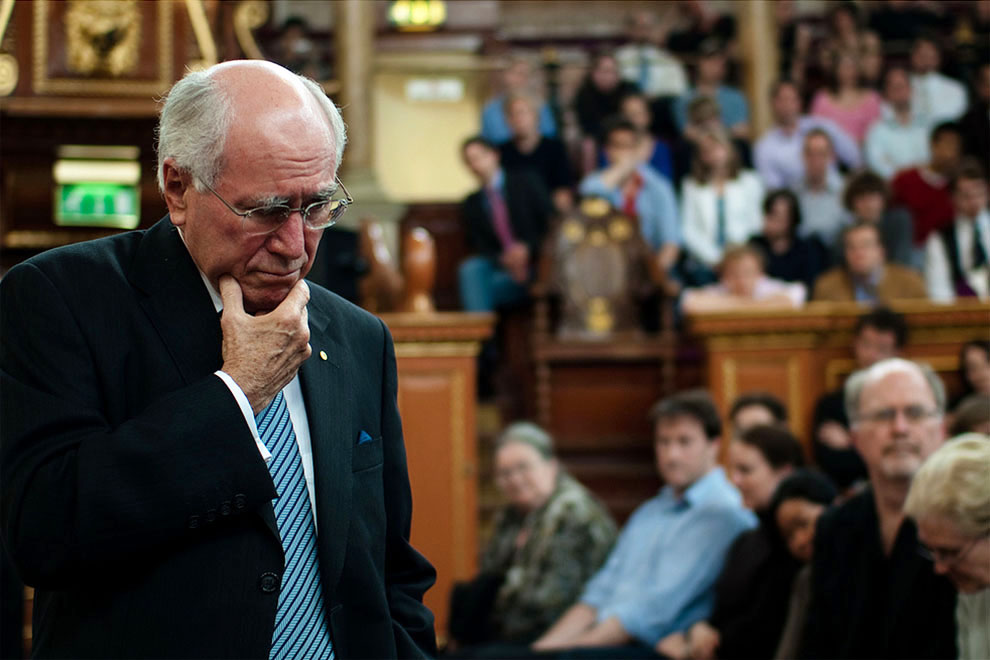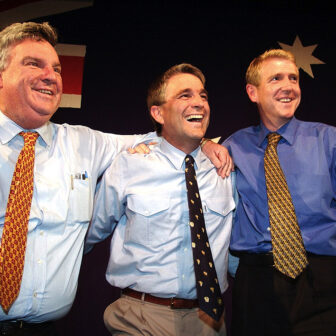As his prime ministership convulses through what appear to be its death throes, Tony Abbott barely bothers any more to try to appeal to the Australian public. Like Julia Gillard clinging on for dear life in her final weeks – when she warned of a threat to abortion rights under a Coalition government – Abbott is rallying a particular subsection of his party’s ideological base.
Times like these seem no longer to be about numbers, but about depth of emotion.
The gratuitous, counterproductive dig at “Muslim leaders” in Abbott’s national security announcement, and the ferocious parliamentary attack on the president of the Human Rights Commission are aimed at people in the backrooms who already have low opinions of the PM’s targets.
But survival in the party room, like winning general elections, is all about the calm, considered collection of numbers. A vote is a vote regardless of strength of feeling.
Over the political turmoil of the last seven years – the immolation of Kevin Rudd and then Gillard, of Rudd at the ballot box, and now, it seems, of Abbott – hovers the ghost of John Howard, the country’s second-longest-serving prime minister. For eleven and a half years he remained securely in the job, and when his end came it was not so much a result of great anger in the electorate as of a view that it wouldn’t hurt to let Labor run things for a while.
Howard hovered over that next government, and particularly over Gillard. Her fondness for invoking him became evident soon after she took the leadership in 2010. It was all values and “boat people” and liking sport – being just like Mr and Mrs Average. She talks of him to this day, referring to the “Howard test.” Her Howard test, the distillation of the lessons she drew from his prime ministership, was a major reason why she was unable to gain authority.
Abbott mentioned his mentor a lot after he became opposition leader in 2009. Politically, it made much sense: another Coalition government would bring a quick return to those times of bounty, open wallets and confidence before the global financial crisis. That message ceased immediately on taking office, again for understandable reasons, because it was always unrealistic. There can be no returning to those days, not for many years anyway. The theme became: we are slowly and carefully fixing Labor’s mess. It’s all Labor’s fault. Things were worse under them, and now they’re getting better.
The Coalition borrowed this from Howard’s prime ministership too. In the early days, treasurer Peter Costello was particularly effective at demolishing the economic record of the Hawke and Keating governments. And the Howard template is creeping back in other ways. The Muslim dig was something one can imagine coming from Howard’s lips.
John Howard is held up by both sides of politics, and across the commentariat, as the emblem of how to do Australian politics. They say he manipulated the electorate, and the ballot box, at will. Regardless of what you thought of his policies, he knew how to play the political game.
But in reality he offers few lessons for his successors, and they are largely procedural: running an efficient cabinet and office, making clear decisions, maintaining warm relations with the backbench. Work hard, keep on top of briefs. His political skills, in the public sense, were and remain wildly, madly overrated, and any politician who tries to replicate him is destined to get in a tangle.
As a politician, Howard was a lucky, lucky guy. Not in the sense that fortunate things kept happening to him, but because he had one magnificent stroke of luck: being opposition leader at the all-but-unlosable 1996 election. What a time to enter government that was, following the early 1990s recession, with the international economy upticking into the longest period of sustained growth in generations.
It was no coincidence that Tony Blair, elected the following year in Britain, and Helen Clark, two years later in New Zealand, also proceeded to ride high. Canada’s Liberals under Jean Chrétien were the same from 1993, and so were all those state Labor premiers and chief ministers here who racked up record election wins.
Growing employment, rising wages and house prices, low interest rates and inflation, credit cards at the ready. Escalating tax revenues and budget surpluses. All of this contrasted so strongly with the recent past.
(Both Howard and Blair could boast of a return to surplus in 1997. The two nations’ trajectories had been almost identical, with the Conservatives under Margaret Thatcher and Labor under Hawke posting surpluses from the late 1980s that were buried by the recession from 1991.)
Of course, good governments facilitate economic success, in the long term at least. But regardless of how much credit Howard and Costello can take, and also how much was due to the reforms of their immediate predecessors, Howard’s electoral longevity was mostly due to the good times and wonderful economic story he had to tell.
The Rudd government was elected in 2007, less than a year before the floor fell out of the world economy. It was very unlucky; government revenue plummeted and fortunes haven’t changed much under the Abbott government. If revenue as a proportion of GDP had remained at Howard-era levels after 2007, for example, the Gillard government would have posted surpluses for its last three years. (This is quite easy to see here.)
Yet, for much of the media and academia, and the Australian political class in general, Howard was successful for different reasons. The prime minister’s evident lack of pizzazz, so unlike Blair, Bob Hawke and Bill Clinton, meant a charisma-charged success story didn’t work, so it was Howard’s very ordinariness that propelled the narrative. And other things: “battlers,” “values” and “conviction politics.” All good fun to write about; storytellers do need their stories.
Legendary American newsreader Walter Cronkite was once quoted as suggesting Australia had “too many reporters, not enough news” and there might be something to that, particularly in federal politics. So much of our journalism is devoted to politics, and little of it is about policy. It’s the horse race, the personalities and the party dynamics. Australian journalists and academics, and the political class generally, seem particularly susceptible to personality-focused explanations, in three acts.
It’s time for us all to get over Howard. If the next prime minister wants to stop the leadership turnstile, that would be a place to start. •





